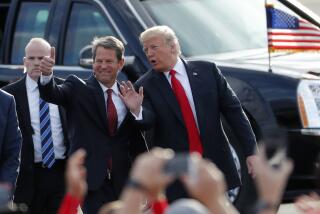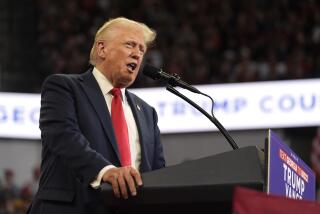Kemp Thwarted in Goal to Win Conservatives
- Share via
WASHINGTON — Three summers ago in sweltering Dallas, the cheers of the jubilant, conservative-dominated Republican National Convention were nearly as long, loud and heartfelt for New York Rep. Jack Kemp as they were for Ronald Reagan himself.
Delegates, assembled to launch the Reagan-George Bush ticket on its triumphant way back to the White House for a second term, erupted into thunderous applause at the passing mention of Kemp’s name and gave him a worshipful ovation when he appeared on the podium.
Conservative Fervor
It was as if Kemp’s quest to become Reagan’s successor in 1989 was ready to take flight on the wings of conservative fervor. Some serious observers of the Republican landscape believed he might quickly make himself the right wing’s 1988 alternative to Vice President Bush.
But if Kemp ever had a real chance to be the preemptive choice of the Republican right in the 1988 campaign, that goal has eluded him. A host of factors, some organizational and some ideological, have thwarted Kemp’s claim to carry the banner of all conservative true believers.
“Four candidates right now have a crack at running ahead of him in Iowa,” said Howard Phillips, chairman of the Conservative Caucus. “If he is worse than third in Iowa, he would then lose his chance of doing well in New Hampshire.”
Kemp’s campaign disputes Phillips’ assessment of the situation in Iowa, where next year’s Feb. 8 party caucuses launch the climactic battle for the nomination. But no one seriously challenges his conclusion that such an Iowa catastrophe, followed by a poor showing in the New Hampshire primary, would be fatal.
Nearly every poll now puts Kemp significantly behind Senate Minority Leader Bob Dole of Kansas as the strongest challenger to front-runner Bush. And in Iowa there are signs that television preacher Pat Robertson and former Delaware Gov. Pierre S. (Pete) du Pont IV could topple Kemp from his position as one of the GOP’s Big Three.
This is the same man who, as much as anyone except Reagan himself, led Republican conservatives out of the political wilderness a decade ago. It was he who spread the gospel of supply-side economics, and his unorthodox proposal for a massive income tax cut was adopted by presidential candidate Reagan and converted into a centerpiece of his new Administration.
But Kemp has been unable to turn that record into the unquestioned support of doctrinaire leaders of conservative interest groups.
No longer does he stand out as a lonely radical challenging the Establishment. The whole Republican Party has moved right.
The 1981 tax cut, which once made him the hottest property in the Republican Party, has faded from short political memories. To many conservatives, Dole is as satisfactory as Kemp on fundamental doctrine.
Kemp has so diligently championed supply-side economics--”voodoo economics,” presidential candidate George Bush called it in 1980--that he still tempts the label of a one-issue candidate. Perhaps because he was a professional football player before he entered politics, his critics are prone to question both his maturity and his intellectual depth.
Organizational Problems
More than that, he has encountered early organizational and fund-raising problems common among first-time candidates for national office.
Nor are these the only causes for Kemp’s predicament. There are additional factors, perhaps more important:
--The candidate and his top campaign lieutenants say expectations were excessively high. Despite Kemp’s prominence in the House and his role as the originator of the Reagan tax cuts, they contend that Bush and Dole hold jobs that give them an important advantage in name recognition.
--Phillips contends that Kemp’s positions on several issues have been unsettling: “He badly hurt himself in early support for sanctions against South Africa. . . . He has hurt himself with his stand on union issues. . . . Too often he has said that balancing the budget is not important. . . . There have been other things such as his vote (for) the Martin Luther King birthday holiday that stuck in the craw of a lot of conservatives.”
‘Still on the Fence’
--Richard A. Viguerie, the conservative activist and fund-raising expert, maintains that Kemp’s potential supporters are still on the sidelines because, “for the first time in a lifetime, they haven’t known a year ahead who they were going to be voting for. Seventy-five percent of conservatives are still on the fence. The bad news for Jack is that he has not solidified his base in the conservative movement. The good news is that no one else has either.”
In an age when television imagery is of supreme importance in national politics, Jack Kemp is the closest thing either party has to a glamorous candidate.
Father of Four
He is handsome, gregarious, married to his cheerleader sweetheart, father of four and still seemingly a lot less than 53 years old, which he will be on July 13. Seventeen years after his retirement from professional football, his grin and shock of graying rust-brown hair still give him a certain boyish appearance, although he now requires reading glasses.
An impeccable dresser who, like nearly all politicians, favors red ties, he still moves with athletic grace, his girth having expanded somewhat less than his horizons.
Windy Discourses
His verve, unfailing optimism--”I think we are entering the Golden Age in the 1990s”--and windy discourses that pin audiences to the backs of their seats have caused him to be compared to the legendary Hubert H. Humphrey. But like former Secretary of State Alexander M. Haig Jr., who is also running for President, he is sometimes inclined to deploy words not fully under control, especially when he delves deeply into the arcana of supply-side economics.
Kemp’s conservatism is an amalgam of traditional and New Right tenets that sometimes seem to fly in the face of each other. Curiously, his most implacable opposition comes from the National Right to Work Committee, which condemns his failure to support a so-called right-to-work law and insists that Kemp continues to cozy up to organized labor.
Although often considered radical, Kemp may be more accurately a transitional figure.
“I don’t think it is right to defend the status quo,” he said in an interview last week, “because not everybody has access to the status quo. I favor change. I take teasing over using words like ‘progressive’ and ‘conservative’ at the same time.
A Reformer on Taxes
“On foreign policy, defense and fiscal responsibility, you can probably pick where Kemp is going to be conservative. But on things like taxes, was I conservative, progressive or a reformer? I think I was a reformer. On trade, I think I would probably come down as a liberal, with a little ‘L’ ” because he is opposed to protectionist measures.
Some of his supporters question whether he has the stomach for the kind of aggressive campaign that will rally staunch conservatives who are ambivalent about Reagan when, for example, he pursues an arms control agreement with the Soviet Union. But for Kemp, opposing the still-popular President risks alienating a wide variety of Republican voters.
Perhaps more than any of the other candidates, Kemp has publicly--but gingerly--disagreed with Reagan. He called on Secretary of State George P. Shultz to resign early this year because he had not supported Reagan foreign policy positions strongly enough. A hard-liner on arms control, Kemp may oppose ratification of the prospective U.S.-Soviet treaty banning intermediate-range nuclear missiles from Europe.
Opposed Greenspan
He objected to the President’s nomination of Alan Greenspan to head the Federal Reserve Board and would have preferred that the chairman be chosen from among the current board members, who include some staunch supply-siders. Because he does not believe that a balanced budget is the key to a healthy economy, he opposes a constitutional amendment mandating a balanced budget, which is one of Reagan’s pet causes.
For a man who now would be President, Kemp launched his political career almost by accident.
Growing up in Los Angeles as the third son of a small trucking company owner, Kemp nurtured one consuming ambition--to play professional football. He majored in physical education at Occidental College and became the starting quarterback of the San Diego Chargers in 1959.
In 1962, a defensive lineman the size of a slaughter steer stepped on his throwing hand, crushing the knuckle on his second finger. It should have ended his career. But Kemp opted to have the finger permanently set to the curve of a football, leaving him with a grip designed for throwing forward passes but also serviceable for shaking hands and slapping backs.
Claimed by Buffalo Bills
The Chargers did not protect their rights to Kemp, and he was claimed by the Buffalo Bills for $100. He went on to play another seven seasons, lead the Bills to two American Football League championships and win the league’s most valuable player award.
By 1970, he had also broken both ankles and both shoulders, and suffered a dozen concussions. His football skills were waning.
Buffalo fans were grateful enough to elect him to Congress. The tale told later was that they turned out en masse to send the aging quarterback to Washington because he announced he would keep playing football if he failed to get elected.
Until that campaign, his involvement in politics had consisted of a summer working for Richard M. Nixon’s friend Herbert G. Klein at the San Diego Union and another working for Gov. Ronald Reagan in Sacramento.
As he now recalls it, Kemp went to Congress as “a conservative, right-wing Republican who wanted to balance the budget. I had a green eyeshade, (an accountant’s) mentality that a balanced budget was the only thing that really counted.”
“But I started going around talking to labor unions and working people and small businessmen and women and people on the street, and I found out there was just too much suffering. I came to the conclusion that I had to find a better way of addressing the problems of Buffalo if I was ever going to be reelected.”
Thus began Kemp’s conversion to supply-side economics, which preached massive income tax cuts as a way to stimulate the economy. His most important convert, in turn, was Ronald Reagan.
Although he has been a national figure for years, Kemp is an underdog with an underdog’s strategy.
Bush’s Upset of Reagan
“We have to do what George Bush did in 1980 or what Gary Hart did in 1984,” said chief Kemp strategist Charles Black, referring to Bush’s upset of Reagan in the Iowa caucuses, and Hart’s stunning upset of Walter F. Mondale in the New Hampshire Democratic primary. “We are going to follow that model.”
Neither Bush nor Hart won his party’s nomination. Kemp, however, hopes to triumph by finishing ahead of Bush at the Jan. 29 Michigan Republican Party convention and then finishing at least a strong third in the Iowa caucuses. That would permit him to separate himself from the rest of the pack following Bush and Dole before the New Hampshire primary.
“In New Hampshire, the dynamics of the state are much better for a conservative,” Black said, “and the issues are good for Kemp. I don’t think we have to win, but I think we have to show progress--finish second, or at least be competitive, and start closing the gap.”
Kemp added that a second-place finish or a strong third in New Hampshire would position him well for the subsequent primaries in the South. “Then,” he said, “it would be kind of a campaign between the old guard of the Republican Party and what we think our campaign represents--the future, the opportunity side.”
Plagued by Debts
To get that far, Kemp will have to surmount some organizational difficulties. Plagued by debts, the campaign had to cut its Washington staff. John Maxwell, the campaign coordinator sent to Iowa more than a year ago, was replaced in February.
“We were doing all right until we looked at Iowa,” said a campaign official who asked not to be named, “and there we weren’t getting organized. Too many things were falling through the cracks.”
In New Hampshire, some campaign appearances were disappointing as well. The likely entrance of former Sen. Paul Laxalt of Nevada into the presidential race hurt because he, not Kemp, almost certainly will get the support of the conservative Manchester Union Leader, the state’s largest newspaper.
Now there are signs that the first potholes have been eluded.
Successful private fund-raising events have brightened the financial picture. Kemp and strategist Black predict their next report to the Federal Election Commission will show the campaign has raised about $2 million, enough to keep its political plan on track, and pull nearly out of debt, although its coffers will not compare to the vice president’s.
More to Read
Get the L.A. Times Politics newsletter
Deeply reported insights into legislation, politics and policy from Sacramento, Washington and beyond. In your inbox twice per week.
You may occasionally receive promotional content from the Los Angeles Times.










